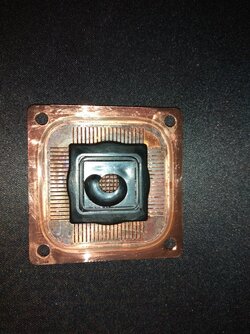- Thread Starter
- #21
Hello,
yeah I did use vinegar, 10% also 100% and when I get mad about it i used 33-40% H2SO4. It has changed it to lets say jelly and I was able to get some of this out. But this is what has left and it is not reacting with anything. So I believe that it should not spread to my loop as "strong" things were unable to get it out? And oxidaction will be on every copper part in the end?
yeah I did use vinegar, 10% also 100% and when I get mad about it i used 33-40% H2SO4. It has changed it to lets say jelly and I was able to get some of this out. But this is what has left and it is not reacting with anything. So I believe that it should not spread to my loop as "strong" things were unable to get it out? And oxidaction will be on every copper part in the end?
